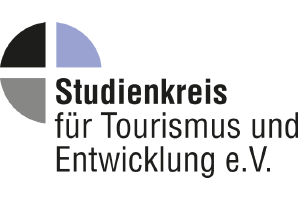03.06.2019 - Seefeld
The Role of Tour Guides
We visit countries far away, but our experiences often remain sketchy. As facilitators between cultures, tour guides play an important role. In “Intercultural Tour Guide Qualifications“ they are being prepared for their multifaceted tasks.
Download PDFWhat images do we have in our minds when travelling to foreign countries? Do we expect a paradise, as travel catalogues or promotional films suggest? Or are we influenced by the media coverage often focused on conflicts – which blows up national grievances or disasters? Which of these holds? “In between those extremes are the country’s people and their daily lives“, says Dietmar Quist, board member of the Institute for Tourism and Development (Studienkreis für Tourismus und Entwicklung e.V.). “It is the task of tour guides to apply appropriate methods to create a more differentiated view. This is more important than all the touristic attractions, which also have their own value“.
A team of social and cultural scientists develops training concepts and conducts the ”Intercultural Tour Guide Qualifications“ on behalf of Studienkreis. These training seminars for tour guides with job experience have a long tradition. For more than two decades they have been offered and have since been conducted in more than 20 countries, mainly in developing countries and emerging economies. Studienkreis cooperates with tour operators, travel agencies, public institutions, or tour guide associations who have local guides trained in their countries to acquire additional qualifications. The training programmes are supported by the German Federal Ministry for Economic Cooperation and Development (BMZ). There are three levels, with each level encompassing six days of training. Successful completion leads to the respective certificates. The declared objective is to facilitate intercultural, understanding, and sustainable experiences for guests by offering advanced training for local guides in the destinations.
For tour guiding means more than merely imparting information, explains Dietmar Quist. Guests want to know more than just facts about tourist sites. How do people in the destinations live, how do they manage their daily lives? This is also confirmed by research on tour guiding conducted by Studienkreis: 84 percent of the German tourists interviewed would like to receive objective and credible information on the host country and its population; 72 percent want realities of the host country to be imparted in a sensitive manner. According to Quist it is also vital for tour guides to develop an intuition for their guests’ personal and cultural backgrounds. What are their expectations or fears upon arrival? And how to address these? With intuition and empathy – and this is exactly where the trainings of the Basics Seminar (level 1) start from. For intercultural understanding to be successful, tour guides need to train especially their emotional as well as social skills and their cognitive and communicative abilities and need to learn advanced techniques of intercultural tour guiding.
At the beginning of a seminar, the first step is for the tour guides to determine their own position, explains Dietmar Quist. In specific exercises for self-awareness and in the following group discussions, participants understand that they themselves are the ones who can – through their own personality – generate meaningful travel experiences. They learn that their most important role is that of a facilitator – and that in this role they address the tourists’ need of bridging the gap between the often diverging perspectives regarding the host country. Tour guides become bridge-builders, linking the touristic side and local realities. The concept of intercultural learning includes above all encounters between guests and local people. “We encourage tour guides not to do all the talking themselves during their guided tours, but to find partners who will be talking about their daily lives“. Tourists may then pose questions of their own. “This is a piece of real communication, a lively, high quality experience“.
Finally, the methods and techniques taught in the seminars are being practiced in the field – in role plays and on excursions. During a guided tour or walkabout, each participant presents selected topics. The presentations are recorded on video and later analysed. Methodology, voice, language, gestures, facial expressions – what was good, where is scope for improvement? “It is valuable feedback that many tour guides never got in this form“. Having worked in the sector for years, many participants are surprised to see how much there is still to learn in the trainings. They are delighted with the specific methods and exercises that help them to apply their skills in different and better ways than before.
From his many years of experience as a trainer, Dietmar Quist knows where there may still be obstacles – for example in dealing with sensitive political or religious issues in one’s own country. Addressing them does not only require tact, but also good preparation. The Advanced Seminar (level 2) therefore focuses on successful reasoning. In addition to an intensive training it offers destination-specific technical guidance, providing talking points on specific key topics such as society and culture, globalisation and development, religion and identity. “It is about expanding existing knowledge by adding global context and about being able to counter ignorance or spurious reasoning in a sovereign manner“. Eventually, customers such as tour operators or travel agents will also benefit from these trainings. “After a training we often get as feedback that the rate of customer complaints had decreased significantly”, says Dietmar Quist. Tour guides certified by Studienkreis are not just better at imparting background knowledge, but are also more motivated, are better team players, and are able to handle challenging situations. This has a positive effect on the quality of guest services and eventually on the reputation and positioning of a tourism enterprise.
In order to also address the important topic of sustainable tourism development, an additional Sustainability Tour Guide Seminar (level 3) was introduced last year along the lines of community-based tourism: How can the local population benefit from such tourism and be part of organising it? The new seminar module was already conducted twice, in 2018 in Peru and in 2019 in Bolivia, customised to focus on topics related to the respective destinations. What is special about these seminars is a close cooperation between travel managers and tour guides who jointly develop scenarios for sustainable tourist circuits. “We combine the planning and marketing options of tourism enterprises with the knowledge of tour guides, so as to make use of synergies”, explains Dietmar Quist. Tour guides have the best knowledge of potentials and challenges in a region and are in touch with the people. When developing a sustainable tour, social and ecological standards are not the only ones that matter, but so do the needs of the local population. “Everybody should participate in tourism in their own ways. Otherwise, peace in a village may easily be jeopardised“. It is also crucial to ensure transparency regarding the history and the benefits of projects and to tell the stories behind these projects. “Guests would like to know about the positive effects their visit will have“.
Reactions of participants to the newly devised Sustainability Tour Guide Seminar have been very positive. For example Marco Birchler‘s, director of "Casa de Turismo" in Sucre, Bolivia: “I have benefited especially from the instructors’ vast experience and from the many new approaches and ideas for the development of attractive tourism products“. He praises the illustrative examples presented from around the world and the distinctly practical approach. He was particularly motivated by realising that there are many possible ways of conceptualising touristic products and services in the light of an intercultural and sustainable approach – irrespective of the circumstances in a given destination. Another participant whose expectations were exceeded is Lea Quiroga. For many years she worked as a tour guide. Now she is a travel manager conceptualising tailor-made tours in Bolivia and neighbouring Peru and Argentina. The question of how to organise these tours in a socially responsible and eco-friendly manner has become her most important challenge – along with the realisation that she herself can embark on new paths. Lea Quiroga, who already participated in all the three seminars organised by Studienkreis, says that each time she did so she developed new perspectives regarding her own role. “My role entails far more facets and responsibility than I originally thought, and it touches so many aspects“.
More information about the Intercultural Tour Guide Qualifications organised by the Institute for Tourism and Development at www.tourguide-qualification.org.
Text: Stephanie Arns
short Interview with Gloria from Bolivia, Participant of the Intercultural Tourguide Qualification
Weitere News
- Newsletter Februar 2024
- Newsletter Januar 2024
- Newsletter November 2023
- Newsletter Oktober 2023
- Travel for Future?!
- Travel and Help
- The Plastics Paradox
- Sustainability as a Process
- Transforming Tourism
- The Renaissance of Travel Agencies
- Great new world of travelling?
- Opening our eyes to new perspectives!

